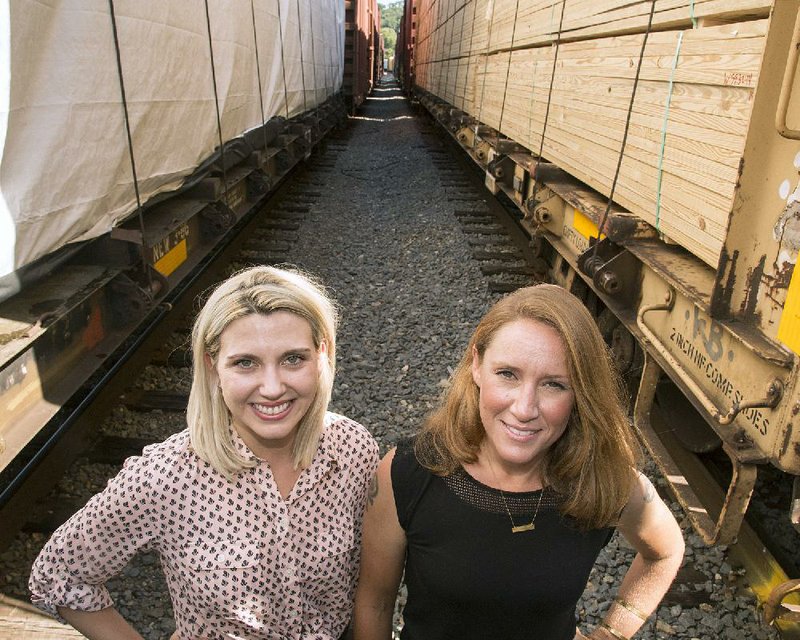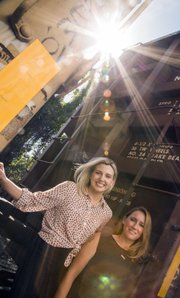On Wednesday nights, people from Little Rock's homeless community gather at Canvas Community Church for dinner and a movie -- a time for a meal and safe social interaction. But for the past year, those Wednesday gatherings have meant something extra for the women in the group.
They know that Katy Simmons and Rachel Achor, co-founders of Arkansas Women's Outreach, will be there with advice, information and much-needed supplies.
Simmons and her children had volunteered with Canvas Community Church and through conversations with the people there, she realized there was a gap in health services. Feminine hygiene products are under-donated, and problems unique to women's health are seldom addressed. There are also some faith-based outreach organizations that, for religious reasons, are hesitant to address some aspects of women's health care, particularly reproductive health.
Through Facebook posts, Simmons knew Achor was interested in the same problems.
Achor points out, "You cannot adequately address the problems of homelessness if you don't prioritize women's health. They have unique health concerns that can't be addressed the way men's health concerns can be."
Brainstorming sessions between the two and with other organizations led them to create the Arkansas Women's Outreach, a 501(c)3 organization designed to fill in the gap.
"We learned the kind of items that weren't being donated, the services that weren't being offered," Achor explains.
In the beginning, their efforts were centered on feminine hygiene products. Lack of these products and education on how to properly use them puts women at greater risk for infection and severe illness. It also perpetuates and exacerbates their situation.
"Without proper underwear, adequate products, getting a job becomes harder," Achor says.
Simmons adds, "It's incredibly debilitating for these women."
So, Simmons and Achor began going to Canvas' dinner and a movie night every Wednesday, providing hygiene products and speaking to the women there.
But the more they worked with the homeless women, the more they realized that the problems went much deeper.
It wasn't just that the women had no access to products. They were also in need of education, mental health care and counseling.
"I have yet to meet with a woman or talk with a woman we've worked with who has not dealt with some form of sexual or physical abuse throughout the course of their life," Simmons says.
In addition to the abuse, they live in situations of high stress, so having access to mental health professionals and counselors, people who can talk to them and who will listen, is very important to their well-being.
Pregnancy rates tend to be high in a community where, Simmons says, "Unfortunately, sex is currency to them."
And, as Achor says, many of these women have drug and mental health problems that, coupled with a lack of education and support systems, creates an environment of misinformation that can be dangerous.
"They don't know what normal is," Achor explains. "A lot of things we take for granted as common knowledge don't apply here."
While most women have a mother or sister or friend they can talk to, Simmons says, "These women don't. There are so many misconceptions about birth control options."
To combat those myths and to make valuable information available, Simmons and Achor have developed partnerships with other local organizations and with the nursing and community health departments at the University of Arkansas for Medical Sciences. Volunteers come to the Wednesday night events to answer questions, give demonstrations and advise the women on physical and mental health matters. They also partner with ARcare to provide remote, rapid HIV testing.
All these are services that, Simmons says, "They won't necessarily seek that out but they're very receptive to it when it's there and offered."
The organization has remained fluid, adapting along the way, which has been vital.
Achor says, "Because of the nature of our program, our overhead is really low and we're able to adapt really easily to what it is the women are needing. We've had our structure change slightly in the year or so we've been doing it but we've been able to be pretty consistent."
Building trust with the women, most of whom have drug problems and too much experience as victims of violence, has been extremely difficult.
But there has also been difficulty in what Simmons calls, "trying to be a constant in a world with no constants."
The women they're trying to help don't have driver's licenses, birth certificates, phones, calendars, alarm clocks. Getting to a clinic can be a monumental struggle.
Even when Simmons and Achor think they have accounted for every possible barrier, they'll run into another unexpected obstacle, a nuance of the homeless lifestyle for which they have to adjust.
"That has been probably the hardest," Achor says. "Trying to maintain consistent effectiveness in a situation that is so much more complex than we could ever really understand."
Simmons adds, "And I feel like I want to make things better but am just not able to make them better right away. A lot of these women deal with horrific situations day after day."
They keep a donation list on the organization's website and they also have an Amazon wish list where people can buy items that will be shipped to them directly. There's also a Paypal account for direct monetary donations. And liking and sharing posts on Facebook has generated a lot of attention and support for Arkansas Women's Outreach.
The items bought and donated go directly to the 35-50 women Achor and Simmons see every Wednesday at Canvas.
Achor encourages women who have extra underwear to donate that, or to pick up extra supplies at the store. And smaller luxury items like nail polish, makeup and lotions, are always welcome.
"Just a little effort and a little bit of thoughtfulness, they know how important it is," she says.
Simmons adds, "It makes a huge impact in their lives."
High Profile on 06/26/2016


